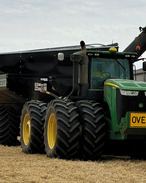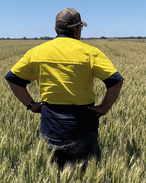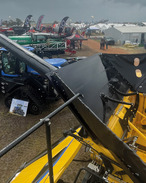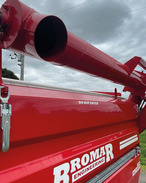This article is 8 years old. Images might not display.
The Rabobank Global Farmers Master Class saw 35 producers from North and South America, Europe, Africa, New Zealand and Australia spend four days in Australia before travelling to Canterbury, New Zealand for the final six days of the program.
Now into its fourth year, the programs are designed to provide a unique opportunity for farmers from around the world to network and share best practice.
Focused on the role of innovation and agri-technology in the future of farming, the 2016 program covered topics including global supply chain trends, succession planning, sustainability, the evolving model of family farms, precision agriculture and social enabling factors.
Delivered through a mix of farm visits and best-practice demonstrations, it also included keynote presentations from industry leaders and farmers from a number of different enterprises and countries.
The Master Class participants also attended Rabobank’s Farm2Fork Summit, which bought together around 1200 agribusiness industry leaders, local and international farmers, food and agri-start-ups, technology innovators and investors at Sydney’s Cockatoo Island on November 3.
For Brazilian farmer Vicente Bissoni, the Global Farmers Master Class provided an opportunity to visit Australia for the first time.
Bissoni is chief financial officer for his family-run business, Botuverá Group, which spans 30,000 hectares in Brazil’s prime agricultural Mato Grosso region.
Describing the Master Class as a ‘lifetime opportunity’, Bissoni said the program provided a platform to share cultures, knowledge and experiences.
“We are often limited to mixing with people from our region or industry, but this experience has given us a global network of farmers that are willing to share and exchange their knowledge in a very open environment,” he said.
Leading US dairy farmer Stephen Maddox from Riverdale in California, was another participant to attend the program.
Chairman of the US National Dairy Board until 2013, Maddox runs a large-scale dairy operation with over 12,000 Holstein cows, and exports RuAnn Holstein stud genetics to Australia.
Maddox also serves on the Sustainability Council for the Innovation Centre for US Dairy, and he is a firm believer in feeding the world sustainably through the improved care of animals, which pays dividends to producers by lifting profitability.
But he said converting these positive messages to consumers can be difficult.
“Today, our consumers want to take away some of the tools we need to remain sustainable, such as GMOs and the latest scientific practices, many of which make farming possible,” he said.
Maddox said there was much discussion around the next trends and steps to remain competitive in the global marketplace, while also continuing to be sustainable.
“Everyone on the Master Class is really pushing the envelope, and the stories and experiences that have been shared have just been mind-blowing,” he said.
“And while the program is not in any way telling us ‘what to think’, it is giving us the impetus to reassess what we are doing and reflect on the next steps for our business.”
Maddox and Bissoni were also joined by five Australian farmers on the Master Class including, quinoa producer and processor Ashley Wiese from WA, managing director of Burlington Berries Kate Sutherland, Queensland cattle producers Nikko and Jade Lord and broadacre cropping farmer David Brownhill from northern NSW.






















